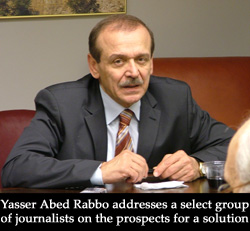FOR IMMEDIATE RELEASE
Contact Information: Hussein Ibish
October 18, 2004 - 12:00am
Washington DC, Oct. 18 -- The American Task Force on Palestine (ATFP) hosted a briefing today by Yasser Abed Rabbo, on strategies for salvaging the two-state solution. Abed Rabbo is an author of the Geneva Accords, a leader of the Palestine Peace Coalition and a member of the PLO’s executive committee. ‘Partial’ or ‘unilateral’ solutions such as Israel’s Gaza withdrawal plan will invariably fail with tragic consequences, Abed Rabbo stressed. This is especially true since the plan is not a total withdrawal from Gaza—Israel will still retain control over the entrances, exits, and airspace of Gaza after the withdrawal—and is therefore not the beginning of a solution, ‘but the beginning of a further deterioration in the situation,’ Abed Rabbo said.
 Abed Rabbo also pointed to West Bank and Jerusalem settlement activity increasing at an unprecedented rate, and the latest Gaza incursion, which resulted in 120 Palestinian deaths, as ‘provocations’ by the Sharon government that the Palestinians should resist being drawn into. ‘Under international law, Palestinians have the right to resist the occupation, but should do so in a non-violent fashion,’ Abed Rabbo said.
Abed Rabbo also pointed to West Bank and Jerusalem settlement activity increasing at an unprecedented rate, and the latest Gaza incursion, which resulted in 120 Palestinian deaths, as ‘provocations’ by the Sharon government that the Palestinians should resist being drawn into. ‘Under international law, Palestinians have the right to resist the occupation, but should do so in a non-violent fashion,’ Abed Rabbo said.
The Geneva Accords, proposed one year ago by Palestinian and Israeli peace advocates, was the first pragmatic and detailed solution to the Israeli-Palestinian conflict, and contained a detailed formula for dealing with the issues of Jerusalem, refugees, settlements, and borders. Since then, Israeli Prime Minister Ariel Sharon has proposed the Gaza unilateral disengagement plan. In September of this year, his former Bureau Chief Dov Weisglass gave an interview to the Israeli newspaper Ha’aretz in which he outlined the aims of the disengagement plan: to prevent a peace process from developing, to secure Israeli settlements in the West Bank, and to prevent the establishment of a viable Palestinian state.
In response to a question following the briefing on the responsibilities of the Palestinian leadership, Abed Rabbo outlined the first steps in improving living conditions and enabling Palestinian society as reforming the Palestinian establishment, giving a new generation of Palestinians a chance to lead by holding elections, and empowering the Palestinian cabinet. However, Rabbo dismissed any link between Israeli actions and lack of Palestinian reform. ‘I don’t believe that Israel is building more settlements, destroying our land, and destroying our lives because we don’t have a reformed Ministry of Finance,’ he said. Internal crises can be addressed using the above steps, though Rabbo stressed that a serious breakthrough in the conflict will result from a comprehensive solution, in which Israel also fulfills its international obligations.
Dr. Ziad Asali, president of American Task Force on Palestine, suggested holding a referendum on the two-state solution in the upcoming Palestinian elections. A positive response would express the will of the Palestinian people in supporting a peaceful resolution to the conflict. Rabbo responded positively to the idea, adding that for such a referendum to be held, the peace process must commence so candidates can campaign on it. ‘Palestinians must have faith in alternatives to positions put forth by extremists in order to support them,’ he said.
TAGS:
















